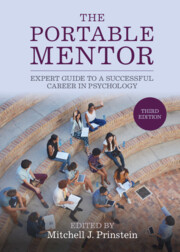Tables
2.2Sub-fields of psychology focusing exclusively on science (without a practice component)
7.1Affirmations from current trainees of color in psychology programs
8.2Sample questions for SGM students to ask on interviews for graduate school
8.4Professional groups and networking for SGM graduate students in psychology
19.1Specialty boards affiliated with the American Board of Professional Psychology
20.2Key strategies for supervisors in training in working with supervisees
21.4The mission statement of the American Psychological Association of Graduate Students (APAGS)
22.3Comparison of political giving among healthcare professions
25.1Summary of likely differences across hospital, academic medical center, university, and industry settings for postdoctoral training
25.3Specialty and proficiency areas currently recognized by the Commission for the Recognition of Specialties and Subspecialties in Professional Practice (CRSSPP)
26.1Top 10 occupations of psychology doctorate degree holders
26.2Top 10 occupations of psychology master’s degree holders
26.3Top skills requested in psychology job advertisements, 2015–17
26.4Demographic characteristics of the psychology workforce, 2008 and 2018
26.5Demographic characteristics of health service psychologists by career stage, 2015

